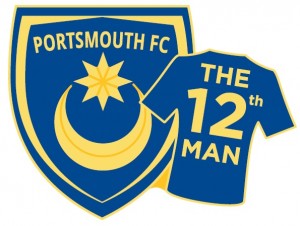FC Portsmouth 5
We’ll support you ever more
This is another song dating back to the early 1960′s. The tune is taken from the Welsh hymn “Cwm Rhondda” (or “Bread of
Heaven”), which is traditionally sung by the Welsh crowd before international rugby matches at Cardiff Arms Park. The tune is
popular in the football repertoire and is used with a large variety of lyrics.
“We’ll support you e-ver-more,
We’ll support you e-ver-more.
Por-or-orts-mouth, Por-or-orts-mouth,
We’ll support you e-ver-more,
We’ll support you e-ver-more.”
A leader usually sings the first line with the full chorus quickly joining in with hand clapping on the beat. As well as a
general expression of praise and encouragement, this song is also used to express the fans’ loyalty to their team when things
are not going too well.
We’re proud of you
This is sung with much sincere feeling, usually towards the end of a hard-fought match in which the team have given good account
of themselves, and have played well against strong opposition, even if they have lost. The tune is the traditional Scottish air
“Auld Lang Syne” which is used in a large number of other football chants.song is often repeated with synchronous hand clapping.
“We’re proud of you, we’re proud of you,
We’re proud of you, Portsmouth!
We’re proud of you, we’re proud of you,
We’re proud of you, Portsmouth.”
Here we go
This must be the most familiar of all football chants, though was not heard on the terraces at Fratton Park until the 1983-84
season. It may have had its origins in Scotland, though exactly how and where we are not sure.
“Here we go, here we go, here we go,
Here we go, here we go, here we go-oh,
Here we go, here we go, here we go,
Here we go, here .. we .. go.”
“Here we go” chant is not restricted to football. It is also sung in several other sports, particularly, one-day cricket, rugby
league and boxing, and it may also be heard on the picket-line and in political and social demonstrations, where solidarity and
togetherness is demanded. Continental football fans also sing a version in broken English! The tune comes from the third theme
of the march “Stars and Stripes Forever” by American composer J.P.Sousa.
During a game the chant most commonly occurs following good attacking play or a goal, and in exciting situations, such as, near
misses, penalties, corners and free kicks. The usual length of the chant is one full verse plus one or two lines of a repeat,
then fading away. The singing is typically accompanied by synchronous clapping in the beat.
Jingle bells
This was one of the great fun songs on the terraces at Fratton Park with the fans bundling around into ane another.
“Jingle bells, jingle bells,
Jingle all the way.
Oh, what fun it is to see
Portsmouth win away.”
There are two versions. The first, ending with “Portsmouth win away”, was sung by the fans at away games. The second version,
ending with “(opposition team) lose away” was sung at home games following a goal for the home club.
We’re on the march
A number of songs and chants in the football repertoire are reserved specially for cup games and are rarely sung on other
occasions. “We’re on the march” is one of these. It first came into the football repertoire in 1978, as the “official” song of
Scotland fans going to the World Cup finals in Argentina. The original words “We’re on the march with Ally’s army” referred to
Ally McLeod the, then, Scotland team manager. In domestic football the song is usually reserved for cup games, with the final at
Wembley stadium.
“We’re on the march with Bobby’s army,
We’re all going to Wem-ber-ley,
And we’ll really shake ‘em up
When we win the FA Cup,
‘Cause Portsmouth are
The greatest football team.”
It was typically sung with considerable rhythm and gusto, either in the prematch period, or during the game itself if victory
appears imminent. The tune taken from the popular children’s hymn, “Jesus died for all the children”. The song was particularly
popular with Pompey fans in the 1983-84 season when Bobby Campbell was team manager.

